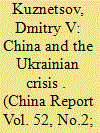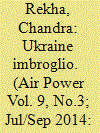|
|
|
Sort Order |
|
|
|
Items / Page
|
|
|
|
|
|
|
| Srl | Item |
| 1 |
ID:
144793


|
|
|
|
|
| Summary/Abstract |
This article examines China’s position on the Ukrainian ‘Euromaidan’ crisis over Crimea, on the war in the southeast of Ukraine and on sanctions against Russia. A complex set of reasons (economic, political and geopolitical) have caused heightened interest on the part of China in the events in the Ukraine. From the start, China kept a very low profile and right up to late February 2014, made no strong statements on the crisis in Ukraine and shunned any diplomatic initiatives. Thereafter, China’s official stand began to exhibit increasingly frequent signs of anti-Western rhetoric, an indication of its position over the situation in Ukraine nudging closer to that of the Russian Federation. China has swung gradually, and somewhat ambiguously, towards support for Russia primarily due to geopolitical reasons. Also, China and Russia share the desire to put up a united front in response to attempts by the United States and other Western countries to impose their attitudes on other countries.
|
|
|
|
|
|
|
|
|
|
|
|
|
|
|
|
| 2 |
ID:
146818


|
|
|
|
|
| Summary/Abstract |
Protest can be seen as a highly democratic expression of popular opinion. However, protest is also a non-representative, extra-institutional process for political change. In hybrid regimes, such as Ukraine, the legitimacy of effecting change through mass protest is a subject of debate. Because of the influence of mass protests in Ukrainian politics, individual views on the democratic legitimacy of protest are potentially important in perceptions of government legitimacy. Using original survey data from December 2013, this article finds that, whereas satisfaction with the functioning of democracy, partisanship, and the oft-cited regional divide are important determinants of approval for the Euromaidan protests, they do not influence how Ukrainians perceive the role of protest in a democracy. However, among those less committed to democracy, protest is more likely to be seen as illegitimate.
|
|
|
|
|
|
|
|
|
|
|
|
|
|
|
|
| 3 |
ID:
146325


|
|
|
|
|
| Summary/Abstract |
The essay examines the impact of the Euromaidan protests and the subsequent Russian aggression on Ukrainian national identity. It demonstrates that national identity has become more salient vis-à-vis other territorial and non-territorial identities. At the same time, the very meaning of belonging to the Ukrainian nation has changed, as manifested first and foremost in increased alienation from Russia and the greater embrace of Ukrainian nationalism. Although popular perceptions are by no means uniform across the country, the main dividing line has shifted eastwards and now lies between the Donbas and the adjacent east-southern regions.
|
|
|
|
|
|
|
|
|
|
|
|
|
|
|
|
| 4 |
ID:
189167


|
|
|
|
|
| Summary/Abstract |
THE POLITICS OF MEMORY is a necessary and very important tool used in shaping statehood, consolidating society around a set of state-forming ideas and interpretations. In practice, these are activities by the state and other interested parties to manipulate social groups by adjusting or changing their values and their images of the past. The symbols that are employed to this end are signs that are clear and easily recognizable within social subgroups, and that embody certain values/qualities, standards of behavior, or goals.
|
|
|
|
|
|
|
|
|
|
|
|
|
|
|
|
| 5 |
ID:
137830


|
|
|
|
|
| Summary/Abstract |
The recent developments in Ukraine have once again brought the region to a critical juncture in international affairs. What started as anti-government protests soon transformed into intense ethno-political mobilisation with the demand for secession becoming contagious in eastern Ukraine. While analysts are busy examining the triggers for the intense protests, the need of the hour is to evaluate the failure of Kiev to address the underlying factors that have fostered the uprising of ethnic groups in Ukraine since its independence post Soviet disintegration in 1991.
|
|
|
|
|
|
|
|
|
|
|
|
|
|
|
|
| 6 |
ID:
146326


|
|
|
|
|
| Summary/Abstract |
The formation of a party system is widely regarded as a key to successful and sustainable patterns of democratisation. In this essay we examine the evolution of the party system in Ukraine, focusing on the extent to which the Euromaidan has addressed previous problems and weaknesses. So far the post-Soviet Ukrainian party system has been exceptionally unstable as electoral legislation, the factional composition of Ukraine’s parliament, and the dominant parties in Ukraine underwent frequent changes. We argue that, despite advances in democratisation as a result of the revolutionary events of 2013–2014, the essential features of Ukraine’s party system have not changed. The legislative, ideological and organisational foundations of the Ukrainian party-political landscape and parliamentary politics have remained fragile.
|
|
|
|
|
|
|
|
|
|
|
|
|
|
|
|
| 7 |
ID:
161046


|
|
|
|
|
| Summary/Abstract |
This article is a study of the evolution of the Ukrainian national and political identity in the context of the most important aspects of its formation, singled out by the author. The author’s methods are based on the principle of historicism. He analyzes the formation and development of political practices and the political regime in Ukraine in the 20th-21st centuries, and compares peculiarities of the ethnic, cultural and political development of Ukraine with that of Russia and other countries in Eastern Europe. Prospects for the development of the political situation in Ukraine are discussed through the prism of the geopolitical paradigm. The author points out that during the Soviet period there were factors that worked for the separation of Ukrainians from Russians and those that worked against it. In the post-Soviet period, under the influence of growing ethnic and civic nationalism, globalism and some peculiarities of Ukrainian political culture separatist tendencies prevailed. The current conflict in Donbass has entered into a smoldering phase, which is most advantageous to the Ukrainian authorities. He describes as unlikely the possibility of major changes in the Ukrainian regime. The more probable scenario, in his opinion, is inertial.
|
|
|
|
|
|
|
|
|
|
|
|
|
|
|
|
|
|
|
|
|